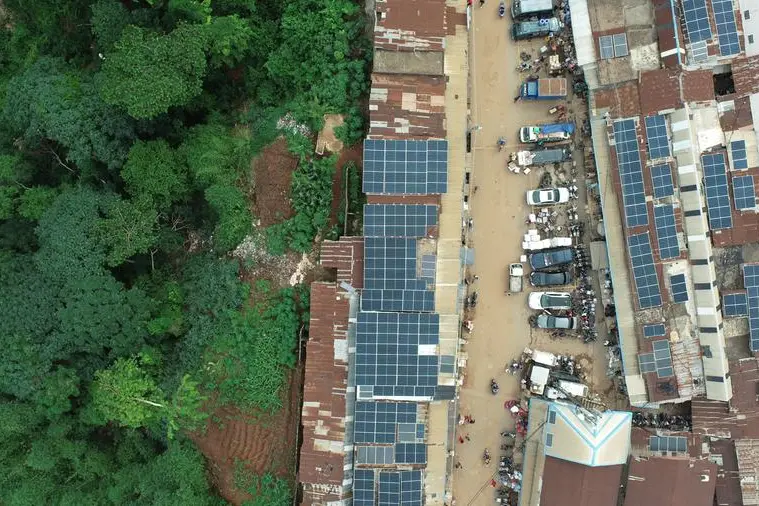PHOTO
As part of efforts to reduce gas emissions and tackle climate change, Lagos State Governor Mr. Babajide Sanwo-Olu launched the Lagos State Carbon Registry on Thursday.
He called on the private sector, civil society, and government to collaborate in building systems and infrastructure that would enable the state to evolve into a truly sustainable city.
The Carbon Registry aims to track and manage the state’s carbon emissions, providing a critical tool for mitigating climate change and fostering environmental sustainability.
Governor Sanwo-Olu, who spoke at the inaugural Lagos Sustainability Summit organized by the Office of Sustainable Development Goals (SDGs) and themed “Building a Resilient and Sustainable Lagos,” held at Eko Hotels and Suites, Victoria Island, Lagos, stated that the global shift toward sustainability was not merely a trend but the defining challenge of the new age.
Represented by his Deputy, Dr. Kadri Obafemi Hamzat, the governor noted that partnership and collective responses to climate change, poverty, and inequality would shape the future of Lagos, Nigeria, and the world at large.
He urged stakeholders to seize the opportunity to build a Lagos that is resilient, inclusive, and globally competitive. “Now is the time for bold, visionary thinking. We must embrace solutions that not only grow our economy but also protect our environment and uplift our people. Together, we can create a city that is not only prosperous but also sustainable for generations to come,” Sanwo-Olu said.
The governor assured that Lagos is working across borders to address global challenges such as pollution, climate change, and biodiversity loss, adding, “Our city’s sustainability efforts are not just local; they are part of a broader global mission to protect people and the planet.”
He emphasized that sustainability is not just about the environment but about creating a city that works for everyone, adding that the future his administration envisions for the state is one where no one is left behind.
Sanwo-Olu underscored his government’s recognition of the critical role sustainability and resilience play in shaping the future, noting that Lagos is more than just a city but a beacon of innovation, culture, and economic potential.
He stated that sustainability has always been central to his administration’s developmental agenda, mentioning that the Lagos Climate Action Plan sets ambitious targets to achieve net-zero emissions by 2050, which will mobilize resources towards green projects.
“We are driving the systemic changes needed to foster sustainable growth without compromising our environment or the well-being of our people. It is a testament to our commitment to building a greener, smarter Lagos,” he said.
Governor Sanwo-Olu also highlighted his administration’s dedication to creating public spaces and services that promote social interaction, safety, and inclusivity. He assured that his government is committed to ensuring that all residents, regardless of income or background, have access to the resources and opportunities needed to thrive.
Minister of State for Environment, Dr. Iziaq Adekunle Salako, in his goodwill message, noted that the production of goods and services, transportation, recreation, and everyday activities are major drivers of global warming through the emission of greenhouse gases.
The minister stated that to achieve sustainable development, there is a need to decouple environmental pressure from economic growth and development and “provide a mechanism for achieving maximum developmental gains with minimal environmental harm while synchronizing our development agenda in harmony with nature.”
Salako emphasized that the Environmental Impact Assessment (EIA) Act CAP E12 Law of the Federal Republic of Nigeria, 2004, mandates both the public and private sectors to ensure the protection of natural resources and ecosystems, promote the sustainable use of resources, control pollution, and mitigate climate change effects.
In his keynote address, Dr. Rabiu Olowo, Executive Secretary/Chief Executive Officer of the Financial Reporting Council (FRC) of Nigeria, encouraged Nigerians to integrate SDG goals into every aspect of their financial strategies. He stated that by doing so, they not only ensure their success but also contribute to a global movement toward a more sustainable and equitable world.
“The task of aligning financial strategies with the Sustainable Development Goals is not just about meeting regulatory requirements or enhancing corporate reputation. It is about driving meaningful change and contributing to a future where economic growth, social equity, and environmental stewardship go hand in hand,” Olowo concluded.
Earlier, in her welcome address, Dr. Oreoluwa Finnih, Special Adviser to the Governor on Sustainable Development Goals (SDGs), stated that the Office of Sustainable Development Goals (OSDG) has pooled its resources, expertise, and resolve to align its activities with the global Sustainable Development Goals (SDGs) and ensure that the vision of a sustainable and resilient Lagos becomes a reality.
Finnih noted that the office’s commitment was not merely superficial but demonstrated through integrated policies, strategic partnerships, and concerted efforts. “The OSDG’s mandate has evolved to lead as the principal SDG coordinator in Lagos by championing initiatives that accelerate the attainment of the 17 goals. For us, sustainability is the practice of meeting today’s needs without compromising the ability of future generations to meet their own needs,” she said.
Copyright © 2022 Nigerian Tribune Provided by SyndiGate Media Inc. (Syndigate.info).





















